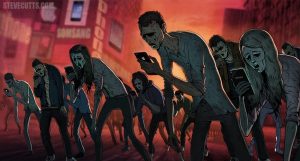I’ve just finished what I have to get done before tomorrow and both my kids are still having their afternoon nap. Gold.
After the last post about identity politics I have reflected more on that topic and decided that I’d like to write more about it, as a way of exploring my own ideas and also as defense against anyone who might think I’m not a consistent feminist and/or defender of the marginalised. However, that will have to come later. In this post what I want to do is talk about the work of Ryan Holiday, which I’ve been reading lately as part of my research and teaching in digital media.
In his two books I’ve read thus far Trust me – I’m lying, confessions of a media manipulator and Growth hacker marketing Holiday discusses his own experiences as a strategic communicator for American Apparel and various other brands, authors and movie producers. The former book ‘Trust me’ is a sort of tell all mea culpa that describes how easy it is to leverage status and page hits into the media stratosphere for contemporary media manipulators… it is by far the better book and includes some nicely cynical insights about the state of online news and publishing at the moment. The latter book is more of a ‘how to’ guide for people who want to grow their online presence. It is much shorter, much more ‘instrumental’.
So yes, Holiday has, in one book, decried the easy and lasting corruption of digital media platforms and in the other, he’s written about how to make the most of it. He doesn’t come off as too hypocritical, in Trust me, he goes out of his way to identify the actual harm that comes from media manipulation and owns up to damage that he himself has caused… but as he himself notes in the introduction to the updated edition, his exposure of everything wrong with digital media hasn’t changed a thing.
So I think that book is a worthy read for anyone interested in moving into ‘strategic digital media’. It has enough reference to media theory and actual instructive lessons to make it valuable. It is not as good on media theory as something like Pariser’s ‘Filter Bubble’ and it doesn’t really explore the full ramifications of the problems Holiday is uncovering… (which you can read more about in my New Media and Society article on ‘The big data public and its problems’) but it does present some pretty insightful and easy to understand lessons about the digital media industry.
The top thngs I’ve learned from Holiday? That RSS and other syndication models are being phased out of new browsers and operating systems because publishers and editors want you to have to check back on their site all the time (rather than receive notification when something you are interested in has been added – in this way, you create more pageviews and more revenue for the site owner). While this probably won’t seem remarkable to anyone else, I find it a really interesting shift… I’ve always thought Aaron Schwartz (inventor of RSS and reddit) was a visionary and if there is a hope for the internet it comes from the deliberation that engaged communities can generate. The book was also great for outining the economies of supply and demand on websites, which generate the banal and baffling content that you find therein.
It’s also clear that the tail is wagging the dog of public interest and debate… but that’s been true for some time now. Reading Holiday made me more fond of public broadcasting systems and more determined not to use tauel.com to chase traffic but rather to explore important ideas that do not get explored elsewhere.

